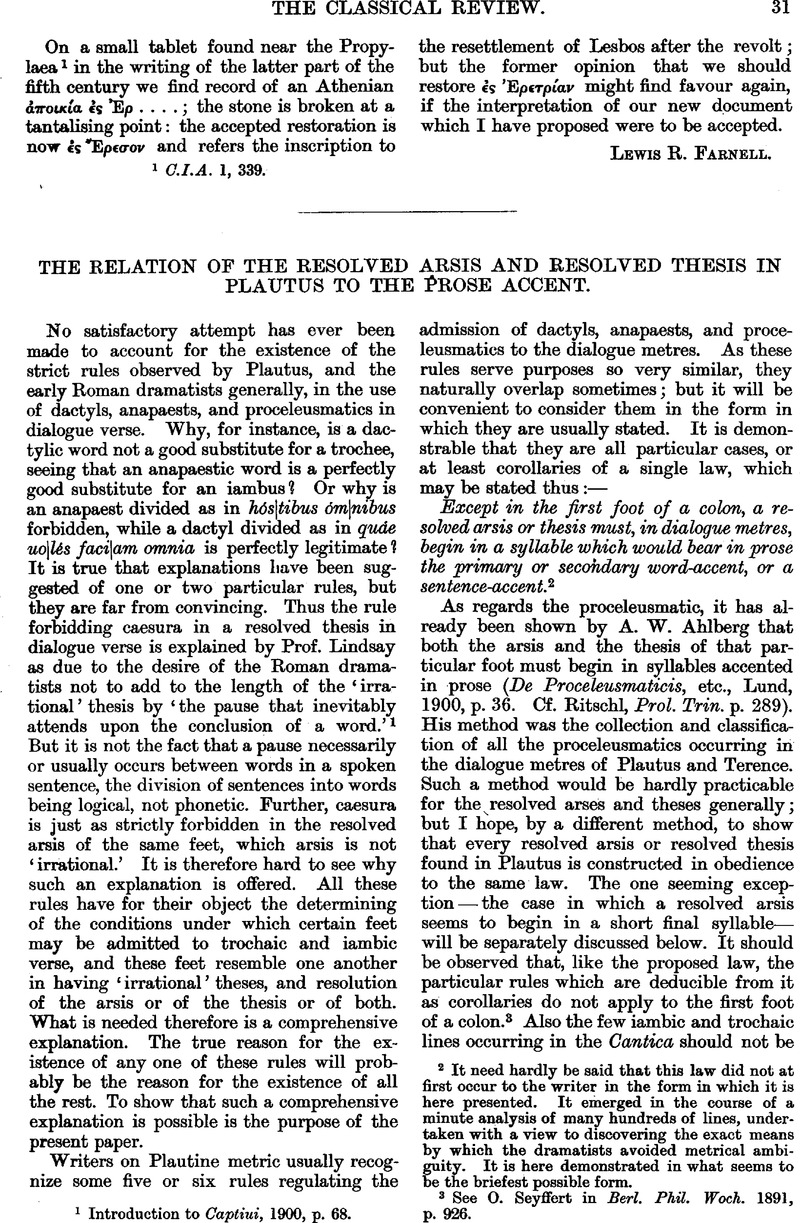No CrossRef data available.
Article contents
The Relation of the Resolved Arsis and Resolved Thesis in Plautus to the Prose Accent
Published online by Cambridge University Press: 27 October 2009
Abstract

- Type
- Original Contribution
- Information
- Copyright
- Copyright © The Classical Association 1906
References
page 31 note 1 Introduction to Captiui, 1900, p. 68.
page 31 note 2 It need hardly be said that this law did not at first occur to the writer in the form in which it is here presented. It emerged in the course of a minute analysis of many hundreds of lines, undertaken with a view to discovering the exact means by which the dramatists avoided metrical ambiguity. It is here demonstrated in what seems to be the briefest possible form.
page 31 note 3 See Seyffert, O. in Berl. Phil. Woch. 1891, p. 926.Google Scholar
page 32 note 1 As these rules are generally recognized, it is not, perhaps, necessary to refer to places where they may be verified. The rules are given in Prof. Lindsay's Captiui 2, Introd. iii. Most of them are also to be found in Klotz's Altrömische Metrik. In some cases Klotz was driven by the exigencies of his theories to deny generally admitted, and indeed obvious facts. Thus he states (p. 274) that the accentuation ![]() (of a dactylic word) is permissible in any part of the line; but of the fifty-two instances there adduced, forty-five are in the first foot, and the remaining seven are in Cantica. Maurenbrecher also questions some of these rules (Hiatus u. Verschleifung, pp. 25 ff.); but succeeds in proving nothing more than that in the text, as we have it, there are some exceptions. Which was to be expected.
(of a dactylic word) is permissible in any part of the line; but of the fifty-two instances there adduced, forty-five are in the first foot, and the remaining seven are in Cantica. Maurenbrecher also questions some of these rules (Hiatus u. Verschleifung, pp. 25 ff.); but succeeds in proving nothing more than that in the text, as we have it, there are some exceptions. Which was to be expected.
page 32 note 2 Cf. Lindsay, I.e. p. 74.
page 32 note 3 Klotz, to suit his theory, allows … ![]() . But all his instances are of the type of Pers. 653: méus patér ubi me sciet, where he unnecessarily scans ubi (p. 257 ff.).
. But all his instances are of the type of Pers. 653: méus patér ubi me sciet, where he unnecessarily scans ubi (p. 257 ff.).
page 32 note 4 Klotz (p. 263) seems to admit ![]() but all his examples are in the first foot, except Aul. 139, which is in a Canticum.
but all his examples are in the first foot, except Aul. 139, which is in a Canticum.
page 32 note 5 De Correptione Iambica Plaut., Lund, 1901, f.
page 33 note 1 ‘The Latin Monosyllables in Relation to Accent and Quantity.’ Trans. Amer. Phil. Association, vol. xxxiv. 1903, p. 66 ff.
page 33 note 2 Cf. Lindsay, Lat. Lang. iii. 7, p. 160.
page 33 note 3 Cf. Lindsay, op. cit. iii. 5 (2), p. 158.
page 33 note 4 I should perhaps apologize for defining a term so generally used; but if it is an error, it is an error on the safe side, and the term is not always used strictly.
page 34 note 1 For the testimony of the grammarians on this point, see Lindsay, op. cit. iii. 12 a (5).
page 34 note 2 Cf. Radford, op. cit., who, using an entirely different method from that here followed, comes to the conclusion that, wherever a short monosyllable causes shortening of a succeeding syllable by the law of Breues Breuiantes, séd ӑpstulisti, ét ӑ me, the metrically stressed monosyllable would have borne a sentence-accent in prose.
page 34 note 3 For a large number of instances, see Klotz, Altr. Metr. p. 257 ff.
page 34 note 4 Prol. Trin. p. 185.
page 34 note 5 For Poen. 1194, Stich. 55, 737, see Klotz, p. 265. The last-mentioned occurs in a scene which is really a Canticum: observe the abnormal ictus amabilis, causing abnormal shortening of the preceding a.
page 35 note 1 I have maintained, in Hermathena xxx. (1904), p. 140 f., that an anapaest is occasionally found for an iambus in the verse-close. That opinion I still hold; but I had not then observed the restriction to which that licence is subject. It is allowed only when the verse ends with a quadrisyllable of the measure of perueniant: e.g. aúiguri´ (Ace. Trag. 624 R), diuiti´s, éueni´nt, súrrupuit. Veniant would be impossible in place of the final iambus; and those editors who postulate peruenant, and the like, give no instances of verse-closes in which the simple verb is required in a form *uenant.
page 35 note 2 See A. Luchs in Studemunds Studien, i. p. 13 ff.
page 36 note 1 Cf. Jacobsohn, Quaestiones Plautimac: Göttingen, 1904.




